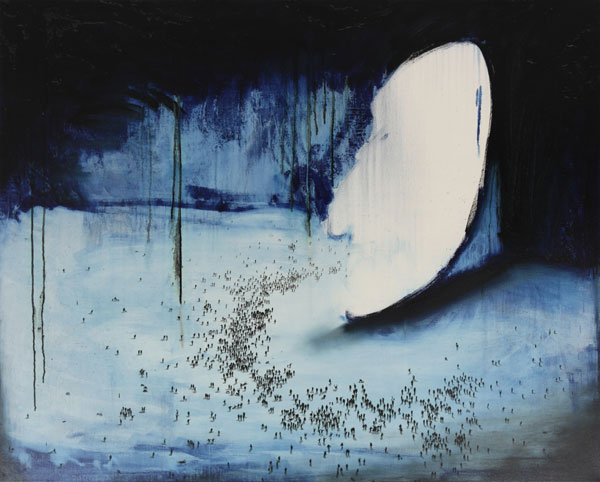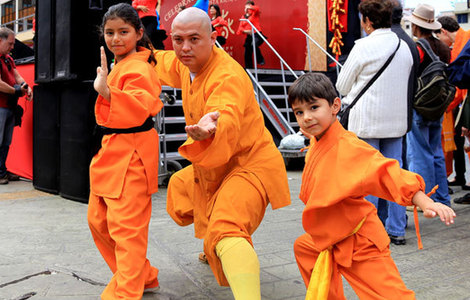Paper, oil and a vision for Chinese art
Updated: 2015-03-17 08:12
By Lin Qi(China Daily)
|
|||||||||
 |
|
Hadrien de Montferrand's latest effort is presenting emerging artist Lu Chao's works at Art Basel Hong Kong. [Photo provided to China Daily] |
His story with China began with a three-month stint at Fudan University to study Chinese in 1997.
Montferrand worked for French auction house Artcurial in Paris before moving to Beijing in 2007. He soon took on the role of development manager of the Ullens Center of Contemporary Art, which had been founded that year.
The job required frequent visits to artists' studios. On those visits, he found many works on paper that were rarely seen by the public. He thought it was a huge waste and saw an opportunity to start his own career.
"I collect paper works, like drawings and watercolors, not only because they are cheaper but also the audiences get closer to the artists through the paper."
The Hadrien de Montferrand Gallery opened to the public in 2009. Visitors can see drawings from artists, such as Lin Gang and Zhong Han, or from well-known artists who primarily work with oil painting.
"When you do a piece of work on paper, it's like doing an entry in your diary. It's very private, with no filter. When you do an oil painting, it's like writing your own biography and it's for other people to read.
"Paper works cannot lie. One can't repaint on paper. It's either bad or good," he says.
Montferrand also advises private museums about the purchase of Western art and China Guardian Auctions for scouting potential customers in Europe.
He has witnessed the development of a more professional Chinese art market.
"Galleries which used to stage exhibitions for making money are now curating good-quality shows."
The decision to open a new space in Hangzhou instead of Shanghai shows his confidence in the rising collecting power of second-tier cities.
"Other than Beijing and Shanghai, the market is also booming in Changsha, Chengdu and other cities where open-minded people buy contemporary art. I need to go deeper into the knowledge of the Chinese art market and to better understand the collecting habits of people there," he says.
"My job is only about human relationships, and it is based on people's trust. I discovered it by working with art. In return, it has made me fall in love with art even more."

 The CeBIT trade fair opens in Germany
The CeBIT trade fair opens in Germany
 Now and then: Lottery dream fading
Now and then: Lottery dream fading
 Braving the snow for greener pastures
Braving the snow for greener pastures
 Special: Preserve the past to live the future
Special: Preserve the past to live the future
 Bruce Lee's legacy promotes Kungfu in LatAm
Bruce Lee's legacy promotes Kungfu in LatAm
 Germany's Black Forest: a popular holiday destination
Germany's Black Forest: a popular holiday destination
 Push for Lunar New Year school holiday
Push for Lunar New Year school holiday
 Sea of color at Shenzhen race
Sea of color at Shenzhen race
Most Viewed
Editor's Picks

|

|

|

|

|

|
Today's Top News
Mutual respect, interests key to US relations
US targets vocational schools in visa crackdown
Washington pitched to tourist
China, Myanmar investigate deadly bombing in Yunnan: FM
Foreign investment restrictions
to be cut
Taking the fight to the terrorists
Action to be taken if deadly bombing happens again
New bureau set to boost graft fight
US Weekly

|

|








